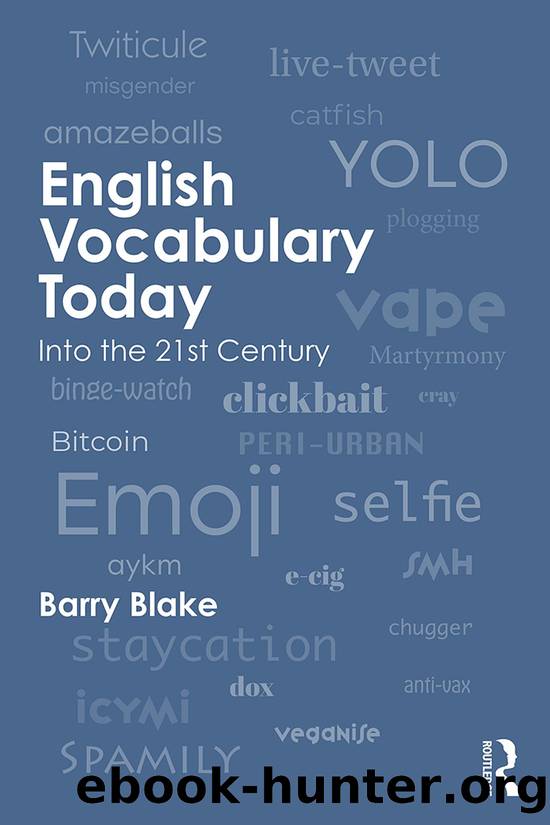English Vocabulary Today by Blake Barry J.;

Author:Blake, Barry J.;
Language: eng
Format: epub
Publisher: Taylor & Francis Group
11.3âRhyming reduplication
There are rather more examples of near reduplication where the just the rhymes match.5 Whereas most of the compounds with vowel alternation involve monosyllabic roots with a few trochaic example (accented syllable followed by unaccented syllable), with the rhyming compounds trochaic examples abound and monosyllabic roots are few. Two that come to mind are ragbag and ragtag. Other typical examples include
argie-bargie, arty-farty, boogie-woogie, easy-peasy, fuddy-duddy, fuzzy-wuzzy, hanky-panky, harum-scarum, heebie-jeebie, helter-skelter, higgledy-piggledy, hocus-pocus, hoity-toity, hokey-pokey, hotchpotch (and the later hodge-podge), hurly-burly, hurry-scurry, hustle-bustle, itsy-bitsy, jeepers-creepers, lovey-dovey, mumbo-jumbo, namby-pamby, nitty-gritty, okey-dokey, pell-mell, razzle-dazzle, super-duper, teenie-weenie and wingding.
Except for hurry-scurry these have in common that they are somewhat obscure. In some the first member of the compound is transparent and the second an apparently arbitrary rhyme: arty-farty (also artsie-fartsie), easy-peasy, lovey-dovey, okey-dokey, super-duper and teenie-weenie. In others both members of the compound are unfamiliar though in some instances this was not always the case. The first element of hurly-burly is an obsolete word meaning âtumultâ or âcommotionâ, ultimately from the verb hurl, which once meant âto move or be driven with violence or impetuosity, to rushâ (OED). The first component of hoity-toity is based on the obsolete verb hoit âto rompâ and the reduplication originally referred to riotous behaviour before acquiring its current meaning of assuming a haughty superiority in manner or attitude. OED suggests the change in meaning may have been influenced by high and height as evidenced by the occasional spelling highty-tighty. Hokey-pokey meaning underhand dealing or just nonsense is based on hocus-pocus. This is first recorded from the seventeenth century and derives from the Latin or pseudo-Latin patter of a conjurer or magician. Harum-scarum is based on the verb hare (to run like a hare) and scare. There is an occasional spelling hare-em-scare-em, which may point to the origin of the mysterious -um, if that is not a folk-etymological attempt at explanation.6 Mumbo-jumbo is used today as a disparaging term for meaningless jargon or nonsense. It has a respectable origin. OED gives, âProbably from Mandinka maamajomboo, the name of a mask or masked dancer representing a cultic society and participating in religious ceremonies.â It has overtones of the colonial era. Fuzzy-wuzzy is a word of the British Empire, a colloquial term for blacks of north-east Africa or Melanesia based on the fuzzy nature of their hair. It would now be thought of as disparaging or racist.
In many of these examples the reduplication is iconic in that it expresses intensity (easy-peasy, hurry-scurry, super-duper, teenie-weenie) and the rhyme with a nonsense component imparts an informal character. Another thread common to some of the set is miscellany as with higgledy-piggledy, hodge-podge, hotchpotch and ragbag (compare grab-bag).7
Quite apart from these well-established examples there has been a recent upsurge in transparent rhyming compounds consisting of two words where the first modifies the second. They are also mostly colloquial and almost all self-conscious attempts to produce something clever or cute. Whereas the well-established examples are almost all trochaic, these modern examples are a mixture of monosyllables and trochees.
Download
This site does not store any files on its server. We only index and link to content provided by other sites. Please contact the content providers to delete copyright contents if any and email us, we'll remove relevant links or contents immediately.
Cecilia; Or, Memoirs of an Heiress — Volume 1 by Fanny Burney(32063)
Cecilia; Or, Memoirs of an Heiress — Volume 3 by Fanny Burney(31458)
Cecilia; Or, Memoirs of an Heiress — Volume 2 by Fanny Burney(31409)
The Lost Art of Listening by Michael P. Nichols(7163)
We Need to Talk by Celeste Headlee(5416)
Asking the Right Questions: A Guide to Critical Thinking by M. Neil Browne & Stuart M. Keeley(5357)
On Writing A Memoir of the Craft by Stephen King(4666)
Dialogue by Robert McKee(4160)
Pre-Suasion: A Revolutionary Way to Influence and Persuade by Robert Cialdini(3977)
I Have Something to Say: Mastering the Art of Public Speaking in an Age of Disconnection by John Bowe(3775)
Elements of Style 2017 by Richard De A'Morelli(3237)
The Book of Human Emotions by Tiffany Watt Smith(3142)
Fluent Forever: How to Learn Any Language Fast and Never Forget It by Gabriel Wyner(2915)
Name Book, The: Over 10,000 Names--Their Meanings, Origins, and Spiritual Significance by Astoria Dorothy(2838)
Good Humor, Bad Taste: A Sociology of the Joke by Kuipers Giselinde(2825)
Why I Write by George Orwell(2775)
The Grammaring Guide to English Grammar with Exercises by Péter Simon(2647)
The Art Of Deception by Kevin Mitnick(2623)
Don't Sleep, There Are Snakes by Daniel L. Everett(2499)
